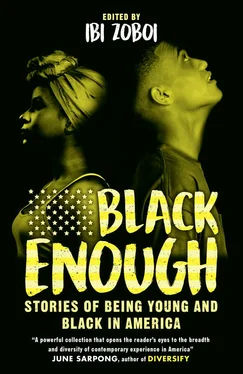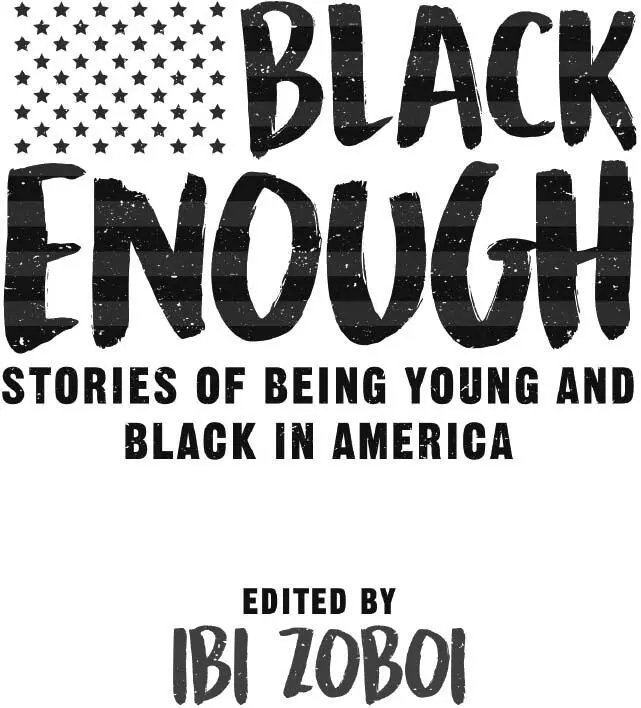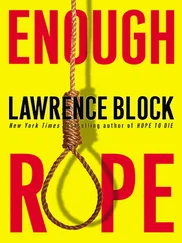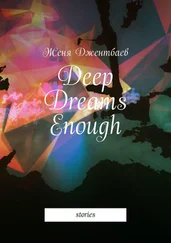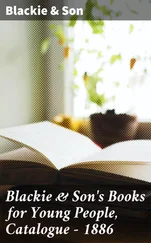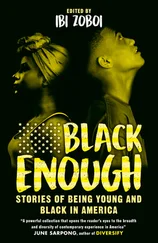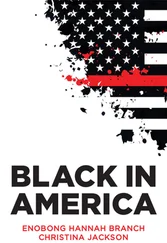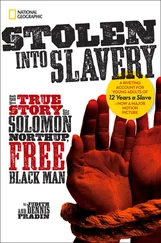
First published in the United States of America by Balzer + Bray in 2019
Balzer + Bray is an imprint of HarperCollins Publishers
Published simultaneously in the UK by HarperCollins Children’s Books in 2019
HarperCollins Children’s Books is a division of HarperCollins Publishers Ltd,
HarperCollins Publishers
1 London Bridge Street
London SE1 9GF
The HarperCollins Children’s Books website address is
www.harpercollins.co.uk
Black Enough: Stories of Being Young and Black in America
Copyright © 2019 by Ibi Zoboi
“Half a Moon” copyright © 2019 by Renée Watson
“Black Enough” copyright © 2019 by Varian Johnson
“Warning: Color May Fade” copyright © 2019 by Leah Henderson
“Black. Nerd. Problems.” copyright © 2019 by Lamar Giles
“Out of the Silence” copyright © 2019 by Kekla Magoon
“The Ingredients” copyright © 2019 by Jason Reynolds
“Oreo” copyright © 2019 by Brandy Colbert
“Samson and the Delilahs” copyright © 2019 by Tochi Onyebuchi
“Stop Playing” copyright © 2019 by Liara Tamani
“Wild Horses, Wild Hearts” copyright © 2019 by Jay Coles
“Whoa!” copyright © 2019 by Rita Williams-Garcia
“Gravity” copyright © 2019 by Tracey Baptiste
“The Trouble with Drowning” copyright © 2019 by Dhonielle Clayton
“Kissing Sarah Smart” copyright © 2019 by Justina Ireland
“Hackathon Summers” copyright © 2019 by Coe Booth
“Into the Starlight” copyright © 2019 by Nic Stone
“The (R)Evolution of Nigeria Jones” copyright © 2019 by Ibi Zoboi
Cover image of girl copyright © Masterfile; cover image of boy copyright © Shutterstock
Cover design copyright © HarperCollins Publishers Ltd 2019
The authors assert their moral right to be identified as the authors of their work.
A catalogue record for this book is available from the British Library.
All rights reserved under International and Pan-American Copyright Conventions. By payment of the required fees, you have been granted the non-exclusive, non-transferable right to access and read the text of this ebook onscreen. No part of this text may be reproduced, transmitted, downloaded, decompiled, reverse engineered, or stored in or introduced into any information storage and retrieval system, in any form or by any means, whether electronic or mechanical, now known or hereinafter invented, without the express written permission of HarperCollins.
Source ISBN: 9780008326555
Ebook Edition © 2019 ISBN: 9780008326548
Version: 2018-12-18
TO VIRGINIA HAMILTON AND WALTER DEAN MYERS.
WE STAND ON THE SHOULDERS OF GIANTS.
Contents
COVER
TITLE PAGE
COPYRIGHT
DEDICATION
INTRODUCTION
JUNE SARPONG
INTRODUCTION
IBI ZOBOI
HALF A MOON
RENÉE WATSON
BLACK ENOUGH
VARIAN JOHNSON
WARNING: COLOR MAY FADE
LEAH HENDERSON
BLACK. NERD. PROBLEMS.
LAMAR GILES
OUT OF THE SILENCE
KEKLA MAGOON
THE INGREDIENTS
JASON REYNOLDS
OREO
BRANDY COLBERT
SAMSON AND THE DELILAHS
TOCHI ONYEBUCHI
STOP PLAYING
LIARA TAMANI
WILD HORSES, WILD HEARTS
JAY COLES
WHOA!
RITA WILLIAMS-GARCIA
GRAVITY
TRACEY BAPTISTE
THE TROUBLE WITH DROWNING
DHONIELLE CLAYTON
KISSING SARAH SMART
JUSTINA IRELAND
HACKATHON SUMMERS
COE BOOTH
INTO THE STARLIGHT
NIC STONE
THE (R)EVOLUTION OF NIGERIA JONES
IBI ZOBOI
AUTHOR BIOGRAPHIES
ABOUT THE PUBLISHER
INTRODUCTION
JUNE SARPONG
Any child of colour raised in the West will have been told early on by their parents or guardians that “they need to work twice as hard” in order to achieve success. Those people may not recall exactly when they had their first “conversation” , but they will remember having it.
For non-white children growing up as minorities in Europe or North America, the first uncomfortable “conversation” with their parents isn’t about the birds and the bees – that comes later – it’s about more pressing matters that will impact them from the moment they leave the safety of their parents’ home and enter the world.
Pre-school can often be a baptism of fire for children of colour. While white children may have the luxury of waiting till their tweens before having to learn about the realities of life, children of colour are told much earlier, their “conversation” being more about the inequalities and discrimination that they will invariably face at some point in their lives. Unfortunately, this is regardless of how privileged, talented or brilliant they might be. This is a heartbreaking burden that parents of colour bear, or white parents of non-white children must face. Children of mixed-race heritage are one of the fastest-growing ethnic groups in Britain, so now many parents who themselves might not have had a personal experience of discrimination are having to have that “conversation” with their children.
In Black Enough , Ibi Zoboi powerfully weaves together a collection of short stories that examine what it means to be young and black in America. These stories bring us up close and personal with heroes and heroines who are trying their best to win on an unlevel playing field: young people refusing to give up even when the odds are stacked against them; young people who will open your hearts and minds in ways you couldn’t imagine.
Like all great coming-of-age adventures, you, the reader, will leave as much changed as the protagonists. Black Enough will open your eyes to US injustices that are just as relevant here in the UK; Black Enough will provide you with a new-found appreciation for the resilience of the human spirit; and, more importantly, Black Enough will remind you of our shared humanity.
Whether you are a young person dealing with similar challenges faced in the pages of this book, a parent wanting to raise “woke” children, or simply an ally for change and inclusion, Black Enough will arm you with extra tools on your journey to make the world a fairer place.
I was born in a country known for having had the first successful slave revolt in the world. Way back in 1804, Haiti became the very first independent Black nation in the Western Hemisphere. If global Blackness had a rating scale of one to ten, the Haitian Revolution has got to be at level ten, being the most Blackest thing that ever happened in history.
But none of that mattered when I first immigrated to the United States as a child. The Black and Latinx kids in my Brooklyn neighborhood didn’t know and didn’t care that my native country had once been a hub for freed slaves from America. According to them, I wasn’t Black enough. I wore ribbons in my hair and fancy dresses to school, and I had a weird accent and a funny name. Most important, I didn’t know how to jump double Dutch or separate a sunflower seed from its shell with just my front teeth, and I was off-key and off-beat when stomping, clapping, and singing to the latest cheers. These were all definitions of Brooklyn’s summertime Black girlhood.
Читать дальше
